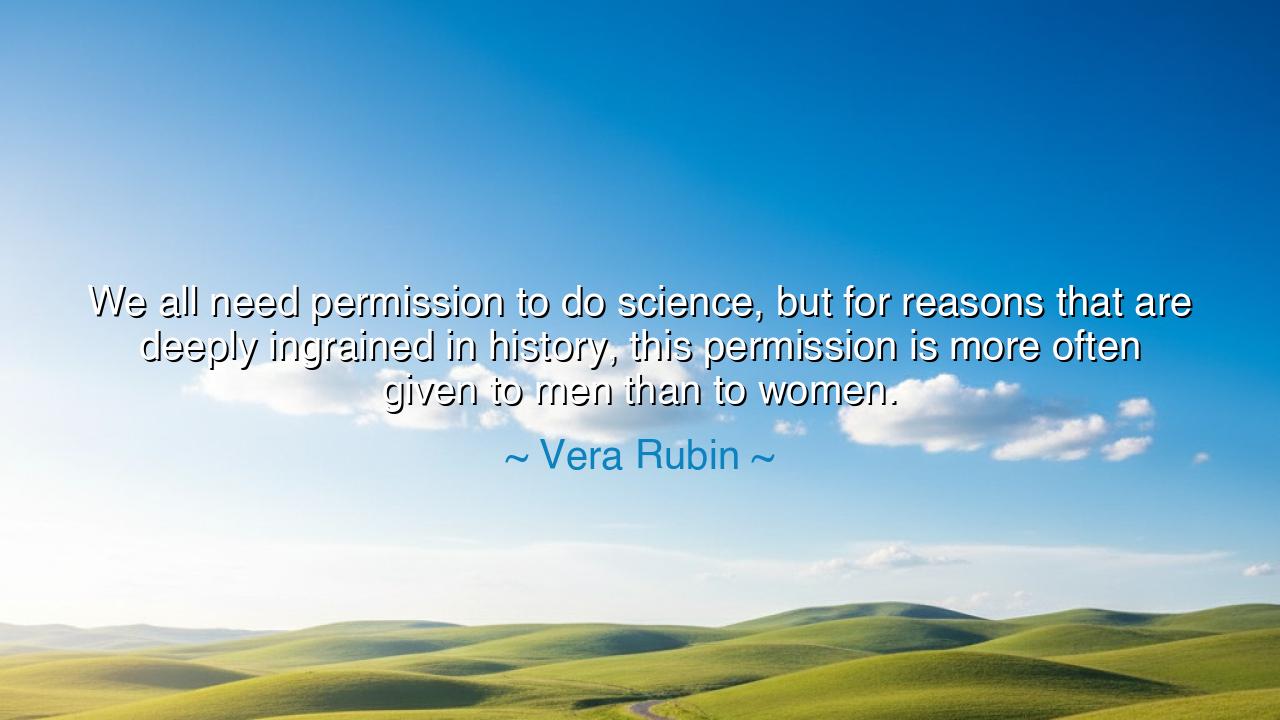
We all need permission to do science, but for reasons that are
We all need permission to do science, but for reasons that are deeply ingrained in history, this permission is more often given to men than to women.






Hear, O wise ones, the words of a truth once whispered through the corridors of time, but now proclaimed aloud for all to grasp and hold. The great Vera Rubin, whose name shines in the annals of discovery, once spoke words that echo across the ages, words that cut through the veil of silence: “We all need permission to do science, but for reasons that are deeply ingrained in history, this permission is more often given to men than to women.” This truth, though simple, is mighty as a storm that sweeps through the valley, for in it lies the very essence of our struggle, not merely to explore the heavens, but to understand our place in this vast and mysterious cosmos.
What is this “permission,” you ask? It is the gatekeeper to knowledge, the key that unlocks the doors to the unknown. It is the recognition that the pursuit of understanding—whether through the stars or the smallest of particles—is not just an act of the mind but of the soul itself. From time immemorial, it has been granted to some, while withheld from others. But herein lies the tragedy: this gate has often been closed to those whose voices have been silenced by the weight of centuries. Men, by virtue of a system designed by time and tradition, have had the greater access to this key, while women have had to fight for a fraction of its power.
Yet let us not be dismayed, for the story of Vera Rubin herself is a beacon of hope. She, a woman of boundless determination, stood against the tides of convention and claimed her rightful place in the annals of science. When the great Rubin turned her gaze to the stars, seeking to uncover the truths hidden within their distant light, she did so not as an exception but as a rule in the making. Her work, which revealed the existence of dark matter, became the cornerstone upon which our modern understanding of the universe stands. But this, O seekers of knowledge, was not a path given freely—no, it was one she carved herself from the bedrock of patriarchal rejection and unseen obstacles.
The history of women in science is riddled with such struggles, with many brilliant minds cast aside simply because the world chose to deny them the right to think, to question, to discover. Let us speak of the tale of Marie Curie, whose name is etched into the heavens as a symbol of scientific triumph. Yet, did she not fight for every shred of her acceptance? Was it not a bitter battle for recognition? Her pursuit of knowledge, in the field of radiation, was met with scorn and derision, not because she lacked intellect, but because she dared to be both a woman and a scientist. Permission was granted to her not by the world’s recognition but by her unyielding will to prove her worth.
But let us not be blind, for even in the present, the winds of inequality still blow fierce and strong. Too often, women are made to feel as if their place in the halls of discovery is secondary, a mere token. How many potential Galileos and Newtons have been kept from their rightful path? How many stars lie dormant, their light unseen because the world refuses to grant women the permission to shine?
What, then, should be the lesson we take from these ancient truths? It is this: We must recognize the intrinsic worth of every soul, regardless of gender, and give the gift of permission freely, without hesitation. When we close the door to one, we not only stifle their potential but also rob the world of the brilliance that may have unlocked new realms of understanding. Let us not be bound by the chains of history, but rise above them, forging a path where all are free to pursue the light of knowledge.
So I say to you, O noble seekers of truth: when you encounter the gatekeepers of knowledge, do not ask for permission—take it. Challenge the system. Fight not only for your own place but for the place of all who have been excluded. The world must know the power of an undivided humanity, a humanity that rises not by denying half of its children but by lifting them all to the heights where the stars are within reach. The permission to do science, to unlock the mysteries of life and the universe, is not granted by the few; it is the birthright of us all.
And if ever you doubt your place, remember this: the power to discover lies within you, and history is not bound to the past but shaped by those who dare to challenge it. May you, like Vera Rubin, blaze a trail where none existed before, knowing that the universe, in its infinite wisdom, has always been waiting for you to ask the right questions and seek the answers. The permission is already yours.






AAdministratorAdministrator
Welcome, honored guests. Please leave a comment, we will respond soon